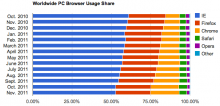Researchers Accuse Google of Plotting to Undercut Firefox
A security testing firm today said a recent report that named Google's Chrome as the most secured browser was flawed -- and part of a campaign by Google to undermine Mozilla's Firefox. Google denied the charges.
The work done by Denver-based security consultancy Accuvant, which released a report last week naming Chrome as more secured than either Firefox or Microsoft's Internet Explorer (IE), was paid for by Google. That raised the hackles of NSS Labs, a California company that tests browser security and antivirus software.








































































